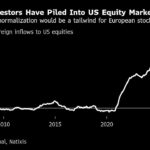
(Bloomberg) — The co-founder of London-based Blue Whale Capital, which has made big consistent gains from Silicon Valley bets, has some advice for market veterans warning of another tech bubble: calm down and buy the dip.
As Stephen Yiu’s main fund nears 1 billion pounds ($1.4 billion) after doubling its money in four years, the likes of Michael Burry are signaling that investors should beware of frothiness in parts of the tech sector. That doesn’t phase 43 year-old Yiu, who prefers the reliability of Google over Netflix Inc., or brands that are now so ingrained in the minds of millennials that the dot-com crash of two decades ago is a mere blip in their browsing history.
People who are “say maybe 10 years older than me, so in their 50s, they probably were in the market at the time, and they got burnt,” Yiu said in an interview at his Mayfair office. “They still think that tech today is the same thing as what happened then, and is going to go bust.”
“Google is not going to go bust. Microsoft is not going to go bust,” added Yiu. “I mean, if the shares go down in any shape or form, you buy it. It’s just like, there is no bubble.”
Yiu was at university during the dot-com boom, when feverish speculation drove valuations of internet-related shares to stratospheric heights in the late 1990s, leading to a punishing bear market that took years to recover. Now, he says, it’s different. While many tech companies are still expensive, they are ubiquitous in most peoples’ lives, backed up by solid fundamentals and have numerous lines of business that are largely profitable.
Blue Whale’s top holdings are more dominated by brands that have become household names over the past two decades, including Google parent Alphabet Inc., Microsoft Corp. and Adobe Inc. It also owns payment firms Visa Inc. and Mastercard Inc. That’s served his investors well, with those that have been there from the start sitting on a more than 110% gain as of Thursday.
“I think to the younger generation, most people actually understand what’s going on,” said Yiu, whose firm was started in 2017 with a 25 million pound investment from 73 year-old billionaire Peter Hargreaves. “If you look at our top 10, at one point, we are probably direct or indirect users of some of these services ourselves, whether it’s personally or through business.”
Bigger Short?
Some well-known investors are waving red flags at the sector. Richard Bernstein, a prominent bear leading up to the global financial crisis, warned in June that the current market passed all his criteria for a bubble and that technology was one of three sectors at the heart of it.
Michael Burry of “The Big Short” fame, who successfully bet against the housing market before its collapse in the crisis, has been building a short position in Cathie Woods’ ARK Innovation ETF. Her fund, which returned 149% last year, invests heavily in tech firms identified as so-called disrupters such as Tesla Inc., Coinbase Global Inc. and Zoom Video Communications Inc.
Blue Whale’s total managed funds recently surpassed 1 billion pounds, with Hargreaves’ own stake now worth around 200 million pounds, according to Yiu.
Yiu has a team of 12 employees, four of whom joined this year, with an average age of about 35. He says the team is relishing being back together after lockdown, citing its collaborative decision making as a driver of the firm’s success, as well as lunchtime crazy golf games in the office.
“When you have a bunch of younger people, I think we probably are a bit more open minded,” said Yiu. “I’ve never really vetoed a decision. That is only possible when everyone is welcoming to that kind of open environment.”
More stories like this are available on bloomberg.com
Subscribe now to stay ahead with the most trusted business news source.
©2021 Bloomberg L.P.





